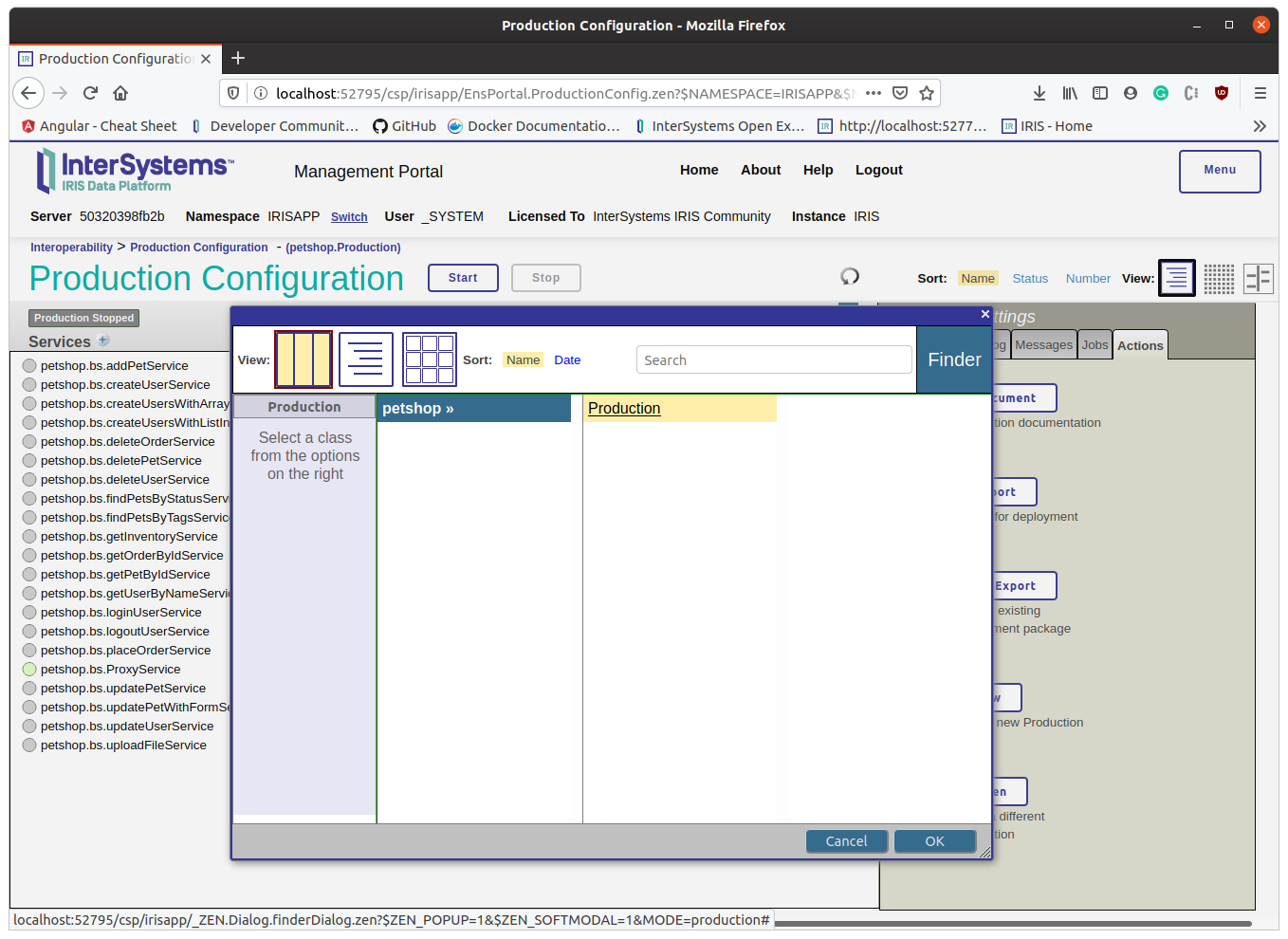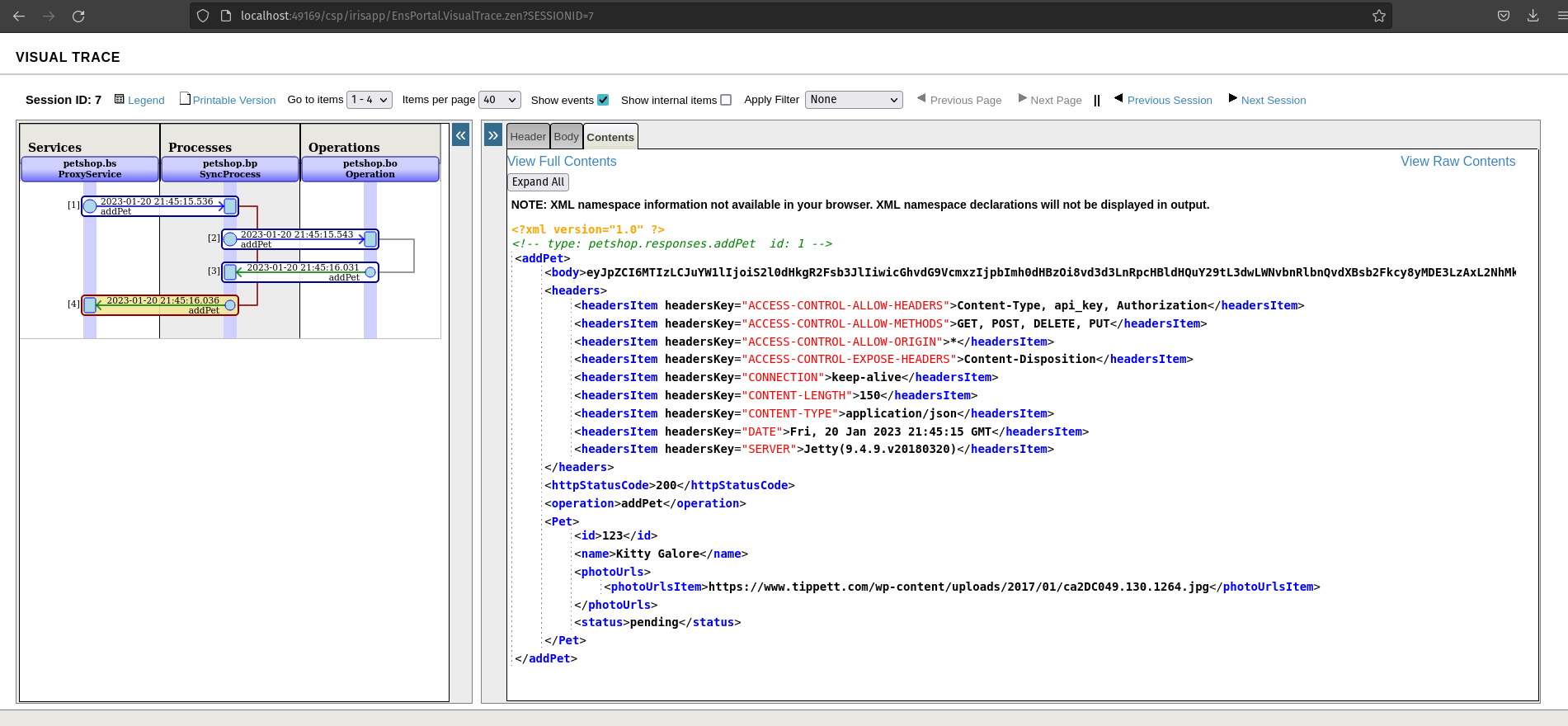
Open API Client Gen  Works
Works
 Works
Works


 2
2 9
9
What's new in this version
Fix an issue with special characters in object property name.
OPENAPI Client Gen
Important : To make maintenance easier, this package has been merged with openapi-suite ( Link to GitHub repository ). Consider this package deprecated and replaced by openapi-suite (classes have kept the same name)
This is an application to generate a simple REST Http client or an Iris interoperability production client from a OpenAPI specification.
Instead of existing tools, this application generates client production.
It could be used as tool to create production on your local instance or to be hosted.
If this application is hosted, a REST api is available to upload the specification document and download the generated classes.
All generated classes are ABSOLUTELY NOT linked in any way with the generator.
Feel free to edit anything to adapt it with your need.
Consider the generated Production\classes client as a template ready to use.
Table of contents
Installation ZPM
You need a namespace with interoperability enabled.
If needed, You can enable the interoperability with:
Do ##class(%Library.EnsembleMgr).EnableNamespace($Namespace, 1)
Installation openapi-client-gen:
zpm "install openapi-client-gen"
There are dependencies, the following packages will be also installed:
Installation Docker
Clone/git pull the repo into any local directory
git clone https://github.com/lscalese/OpenAPI-Client-Gen.git
cd OpenAPI-Client-Gen
docker-compose up -d
Production Sample
In this sample we generate a production client for petshop V3 API REST Api
from the specification 3.0.
Generate interoperatibility classes
Let’s start by generate interoperability classes from petshop swagger V3.
Zn "irisapp"
Set sc = ##class(dc.openapi.client.Spec).generateApp("petshop", "https://petstore3.swagger.io/api/v3/openapi.json")
Write !,"Status : ",$SYSTEM.Status.GetOneErrorText(sc)
The first argument is the package name where the classes will be generated and the second is the OpenAPI specification URL.
Also the method accept a filename or a dynamic object.
The generator accept :
- JSON format.
- YAML format (using yaml-utils to convert in JSON format).
- Swagger specification version 1.x, 2.x, 3.x but version 1.x and 2.x will be converted in version 3.0 using swagger-converter-cli before processing.
Take a look on these generated classes:
-
Business service classes
BusinessService classes are in the sub-packageservices. There is a Business Service for each request defined in the specification document.
The generated classes are templates which should be edited with your need. -
Ens.Request classes
For each request defined, an Ens.Request class are located in the sub-packagerequests.
This class represent all of parameters (query parameters, path, body, headers, formdata).
The Business operation will consume an instance of this class to generate a related http request. -
GenericResponse class
The Ens.Response generated subclass is named “package.GenericResponse” (petshop.responses.GenericResponse in this sample).
It contains some properties to store the body response, headers, http status code, performed operation and status. -
Business Process class
The generated Business process name is simply packageName.Process (petshop.bp.Process in this sample).
This is a basic implementation that redirect all messages to the Business Operation. -
Business Operation class
Probably the most usefull generated class in this project (petshop.bo.Operation in this sample)..
It contain a method for each request and build a %Net.HttpRequest instance from the Ens.Request subclass.
A message map XDATA is also generated to call automatically the related method for the received message. -
Production class
A pre-configured production is also generated named pakagename.Production (petshop.Production in this sample).
All Business Services are disabled by default.
Configure a production
Open and start petshop.Production from production page.
This is the auto generated production.

Great! Our production is ready.
Code snipet
You can find code snipet in the sames petshop class.
Add Pet
Let’s start by add a pet to the public REST service petstore.
Add a pet to Petstore :
Set messageRequest = ##class(petshop.requests.addPet).%New(), Set messageRequest.%ContentType = "application/json"Set messageRequest.body1 = ##class(petshop.model.Pet).%New()
Do messageRequest.body1.%JSONImport({"id":123,"name":"Kitty Galore","photoUrls":["https://localhost/img.png"],"status":"pending"})Set sc = ##class(petshop.Utils).invokeHostSync("petshop.bp.SyncProcess", messageRequest, "petshop.bs.ProxyService", , .pResponse)
If $$$ISERR(sc) Do $SYSTEM.Status.DisplayError(sc)

The example below use the interoperability framework, so there is another way if you don’t want use the framework.
The following example allows to create a pet with a simple http client:
Set messageRequest = ##class(petshop.requests.addPet).%New()Set messageRequest.%ContentType = "application/json"
Set messageRequest.body1 = ##class(petshop.model.Pet).%New()Do messageRequest.body1.%JSONImport({"id":123,"name":"Kitty Galore","photoUrls":["https://localhost/img.png"],"status":"pending"})
Set httpClient = ##class(petshop.HttpClient).%New("https://petstore3.swagger.io/api/v3","DefaultSSL")
Set sc = httpClient.addPet(messageRequest, .messageResponse)
; If needed, you have a direct access to the %Net.HttpResquest inhttpClient.HttpRequestproperty.If $$$ISERR(sc) Do $SYSTEM.Status.DisplayError(sc) Quit sc
Write !,"Http Status code : ", messageResponse.httpStatusCode,!
Do messageResponse.Pet.%JSONExport()
Generate a simple client application
By default generator produces classes for interoperability framework and a simple http client.
If you don’t only the simple http client without interoperability classes, you can use the following command:
Set features("simpleHttpClientOnly") = 1
Set sc = ##class(dc.openapi.client.Spec).generateApp("petshopclient", "https://petstore.swagger.io/v2/swagger.json", .features)
Useful command
Generate production on local machine
By URL
Set sc = ##class(dc.openapi.client.Spec).generateApp("petshop", "https://petstore3.swagger.io/api/v3/openapi.json")
By filename, ex:
Set sc = ##class(dc.openapi.client.Spec).generateApp("petshop", "/irisdev/app/petshop.json")
By DynamicObject
Set spec = {} ; Set your specficiation here
Set sc = ##class(dc.openapi.client.Spec).generateApp("petshop", spec)
Generate simple Http Client (without Interoperability architecture)
Set features("simpleHttpClientOnly") = 1
Set sc = ##class(dc.openapi.client.Spec).generateApp("simpleclient", "https://petstore3.swagger.io/api/v3/openapi.json", .features)
Generate classes for export code purpose only
TSTART
Set features("compile") = 0
Set sc = ##class(dc.openapi.client.Spec).%CreateClientApplication(appName, spec, .features)
Do $SYSTEM.OBJ.ExportPackageToStream(appName, .xmlStream)
TROLLBACK ; Code has been exported to xmlStream, a simple TROLLBACK delete all generated definition in code database.
 zpm install openapi-client-gen
zpm install openapi-client-gen  download archive
download archive  PassedView report
PassedView report
